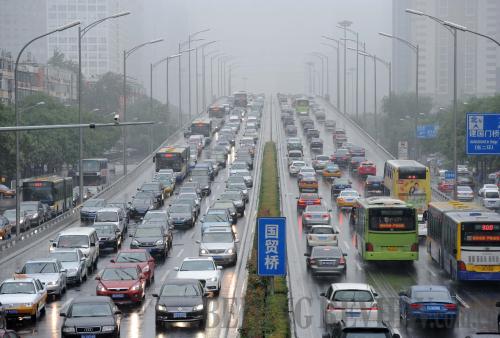|
 |
|
CONGESTION: Heavy traffic clogs Beijing's East Third Ring Road on July 15 (LUO XIAOGUANG) |
During the 2013 Chinese New Year holiday, Wang's carpooling initiative again drew 402,429 applicants, and 9,678 of them eventually drove others or were given a ride.
But Wang Yong does not want to stop there. At the end of May, he convinced the Beijing Municipal Government to greenlight the pilot implementation of a regular carpooling program in the Huilongguan area.
Before the official launch of the program on June 17, 13,000 leaflets were inserted into newspapers and distributed in the Huilongguan area.
On the first day, the program was not received by the residents as warmly as expected. Liu Kunming, a program officer, recalled that when volunteers were handing out leaflets, many drivers shunned them, mistaking the pamphlets for commercial flyers.
On that day, volunteers prepared 300 highway toll vouchers, yet only 14 were claimed and used by eligible carpoolers.
The situation improved remarkably on the third day, when some private car owners stopped to inquire about how to participate in the program, Liu said.
Hu Dan is one of the passengers that got a ride through the program. She has made an arrangement with some drivers to ride in their cars to work for four days a week.
"Carpooling can save me the trouble of squeezing onto crowded buses. It is time-saving and comfortable," Han said.
Data from the Shunfengche Foundation show that in the first month that the program was implemented, it paid highway tolls for 1,645 cars carrying a total of 4,935 persons. That translates into about 75 cars and 224 persons per weekday. The numbers are quite modest in light of the large number of residents in the area.
Obstacles
Currently, the biggest difficulty in promoting carpooling is lack of policy support and public participation, said Wang Yong, adding that many people worry about their personal safety when riding with strangers.
In addition to lack of social trust, accident liability also holds drivers back from sharing their vehicles. According to China's Tort Law and the Supreme People's Court's interpretation of laws related to damage compensation for traffic accidents, a passenger is usually not liable for damage caused by driver's error.
Nonetheless, Dong Laichao, founder of Beijingjtlawyer.com, an Internet portal on traffic laws, said that if a passenger was hurt in a traffic accident and the driver is found to be at fault, the driver has to compensate the passenger even if the ride was free.
The Shunfengche Foundation has prepared a carpooling agreement for drivers and passengers, which has clearly specified liability in case of traffic accidents according to relevant laws and regulations. The agreement states that if the driver has no fault in traffic accident, he or she is not liable for the passengers' loss, whereas if the driver has fault, he or she is liable for the damage he or she has incurred to the passengers.
Besides liability concerns, drivers participating in carpooling are concerned that they might be punished for operating an unlicensed taxi if they share costs with passengers.
In China, vehicles are classified into operating vehicles and non-operating vehicles. Non-operating vehicles are prohibited from engaging in for-profit activities.
"Unlicensed taxis cannot operate under the name of carpooling," said a Beijing traffic law enforcement officer who only disclosed his surname as Xiao.
Xiao said that previously, if a driver discussed payment for a ride with any passenger, the driver will be deemed as operating an unlicensed taxi service. However, he said that now law enforcement officers have become more flexible, and if the driver only charges passengers the cost of a ride, he will not be punished.
Dong suggested that the government should regulate carpooling and build a platform to overcome the information asymmetry between drivers and passengers.
The Beijing Municipal Government plans to release a guideline on carpooling at the end of this year, reported Beijing Times on August 5. The regulation is expected to encourage carpooling and a reasonable split of carpooling costs.
"Carpooling regulations should be detailed. For instance, it should specify how drivers and passengers should split gasoline costs," said Qiu Baochang, head of the legal team of the China Consumers' Association.
Email us at: wanghairong@bjreview.com | 